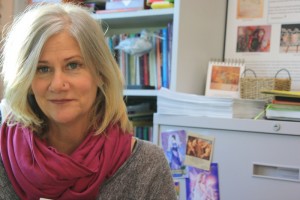Camosun Community Support and Education Assistant program leader Mary Harber recently received funding for a new student initiative called Voice Up. The funding came after a campus-wide call was made for research project proposals that have direct benefits to teaching and learning.
Voice Up is based on the works of Brazilian writer and director Augusto Boal, tackling issues of poverty and oppression through theatre performances. Harber says she wanted to bring something similar to Camosun after attending courses about Theatre of the Oppressed, a style of political theatre developed by Boal.
“I wanted to do something for the campus,” says Harber. “It’s about looking at what issues exist at Camosun based on student experiences, and from those experiences we build short scripts using Theatre of the Oppressed methods.”

Funding for proposals such as Harber’s has been earmarked for a few years and is only now being put to use. Camosun director of learning services Sybil Harrison organized a committee to review the proposed projects, which were then taken to a second committee for review and final approval.
“We took quite a rigorous approach,” says Harrison, “to make sure that funds were going to projects that were well thought out, had some sort of basis in research, and ones that we believed could have an impact at the college.”
Harber’s proposal was chosen because, according to Harrison, it was a unique project that could potentially have a wide reach and a great impact on the student body.
“This project was one that really captured my interest because it was quite different,” says Harrison. “It was an exciting proposal and an exciting idea.”
So far, Harber and her small group of students have had a few preliminary meetings to discuss what they will tackle and how.
“So far we are just bouncing ideas around and talking about oppression issues that we think are relevant to the project,” says Voice Up member Riley Vaskic, who is a student in the Community Support and Education Assistant program. “As a group we will decide what issue we think needs to be focused on the most; from there we will write scripts from our real-life situations and then act them out.”
The idea behind the performances is that during the second run-through of a skit tackling a social issue, the audience members interject with a solution to the problematic scene. Audience participation is key here, something Vaskic is a little worried about.
“For the actual performances, I’m most nervous that people won’t stand up and say something,” says Vaskic. “But I think no matter what, whoever watches it will learn something and take something away.”
With or without audience participation, Vaskic recognizes the value in the performances that she and her group will put on.
“I’m just hoping that from doing these performances we get more confidence and more courage to actually say something when we see an issue,” says Vaskic. “When we do these performances it will give people the time to think about what they would say if they saw an issue like that.”
Vaskic has a preferred social issue she would like to tackle, but the group’s main topic and performance dates won’t be set until spring.
“Personally, I think it would be nice if we could acknowledge mental health issues,” says Vaskic. “I feel like it’s an issue that affects a lot of people, but it’s also kind of an invisible issue.”
Harber would eventually like her project turned into a credited course, free to students and available year-round.
“Ultimately that’s my dream,” she says. “For the time being, what I’m really trying to do is find students who are concerned and passionate about social justice issues, whether it be racism, ableism, homophobia, or sexism.”
Students interested in Voice Up can contact Harber by email at harberm@camosun.ca or call her at 250-370-3223.

